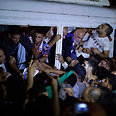
MK Regev: Prisoner release a sign of weakness
Despite inclusion in ruling coalition, MKs Regev, Moalem slam government for voting to release prisoners. Centrist MK insinuates criticism at Right, saying settlement freeze preferable to release
The Knesset's Interior Affairs Committee, headed by MK Miri Regev (Likud), which among other responsibilities overseas the Israeli Prison Service, convened Monday to discuss the matter. Needless to say, the discussion got heated.
Related stories:
- Release of 26 Palestinian prisoners approved
- Netanyahu fails to back Livni on prisoner release
- Gov't divided on issue of prisoners' release
MK Tamar Zandberg (Meretz) verbally clashed with rightwing MKs Regev and Shuli Moalem (Habayit Hayehudi), after the latter lamented the prisoners' release.
"For more than 30 years you have been in power," MK Zandberg told them, after the rightwing MKs blasted what they dubbed "leftist decision-making" on the government's part.
"Thirty years in power?" MK Moalem fired back, "such political blindness I haven’t seen in quite a long while. There have been prime ministers who tried to work towards that peace, yet nothing happened. The current process will lead to nothing but terror. I oppose releasing terrorists as much as I oppose the whitewashed term 'prisoners'."
MK David Tsur (Hatnua), whose party chairwoman Justice Minister Tzipi Livni is leading the Israeli negotiation team, called the prisoner's release "improper conduct" and added that "in the past I have opposed releasing terrorists. I think that among the options the government had – like halting construction – it would have been preferable to opt for another solution. Releasing terrorists is irreversible."
Give & receive
At the beginning of the committee's meeting, MK Regev claimed that releasing prisoners in return for negotiations is a sign of weakness from the perspective of the Palestinians and Arab nations. According to her, despite the goodwill gesture, the move will lead to a rise in terror attacks in the West Bank.
"Why do we need to give anything so talks can resume? Netanyahu once said 'If they give – they will receive, if they won't – they won't receive,' so now we give, and what we will receive will be terror attacks."
The Interior Committee's discussion also focused on the release of the names of the prisoners slated for release. A special ministerial committee approved the rlease Sunday evening, while the prisoners' names were only published late Sunday night. Almagor Terror Victims' Organization Chairman Meir Indor said "Maybe it is a good thing you are embarrassed to publish both simultaneously."
Yossi Tsur, who lost his son during the terror attack on Bus no. 37 in Haifa, was also present at the committee's proceedings. He criticized the manner in which the bereaved families were informed of the release: "Its like a broken telephone, a complete disgrace," he said.
"I presented the prime minister with a clip from BBC 4 in which one of my son's murderers, currently serving 17 life sentences, says that if 'I were to be released I would continue killing Jews.' After my son was killed I was in a state of shock for 24 hours, the mother of the suicide bomber celebrated for three days and refused to mourn," Indor said.
The 26 prisoners to be released were jailed due to crimes performed before the Oslo Accords , and served time ranging between 19 to 28 years. Twenty one of the prisoners are from the West Bank and five are from Gaza. The list of prisoners was posted Sunday night on the Prison Service's website.
The 26 prisoners in the following list are responsible for the deaths of 27 Israelis:
1. Mohamed Ibrahim Nasr, arrested in May 1985
2. Rafi Farhoud Karajeh, arrested in May 1985
3. Mohamed Ahmed al- Sabbagh, arrested in January 1991
4. Hazem Kassem Shbair, arrested in March 1994
5. Ahmed said al-Damuni, arrested in September 1990
6. Yusef Awwad Masalha, arrested in May 1993
7. Sharif Hasan Abu Dhailah, arrested in May 1992
8. Mustafa Amer Ghnaimat, arrested in July 1985
9. Rizek Ali Salah, arrested in June 1993
10. Afu Musbah Shkair, arrested in July 1986
11. Muayad Salim Hijja, arrested in May 1992
12. Najeh Mohamed Muqbel, arrested in July 1990
13. Hilmi Hamad al-Amawi, arrested in January 1994
14. Issa Nimer Abed Rabbo, arrested in October 1984
15. Haza’a Mohamed Sa’di, arrested in July 1985
16. Najeh Mohamed Muqbel, arrested in July 1990
17. Abdel Rahman Yusef al- Haj, arrested in February 1992
18. Osama Zakariya Abu Hanani, arrested in October 1992
19. Mohamed Yusef Turkeman, arrested in October 1992
20. Ahmed Said Abdel Aziz, arrested in February 1993
21. Mohamed Musbah Ashour, arrested in February 1986
22. Omar Issa Masoud, arrested in May 1993
23. Khaled Daoud Azraq, arrested in February 1991
24. Othman Abdallah Bani Hasan, arrested in July 1985
25. Israr Mustafa Samarin, arrested in August 1992
26. Musa Izzat Kura’n, arrested in August 1992
Prime Minister Netanyahu, Defense Minister Moshe Ya'alon, Justice Minister Livni , Science and Technology Minister Yaakov Peri and Internal Security Minister Yitzhak Aharonovich approved the list. Almost all of the those being released were condemned to life sentences.
- Receive Ynetnews updates directly to your desktop










